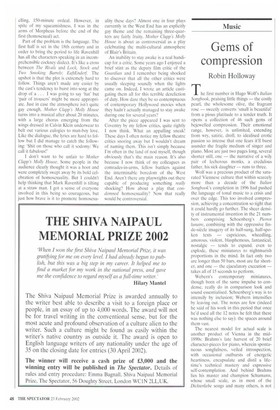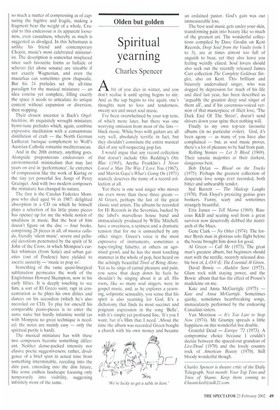Gems of compression
Robin Holloway
The first number in Hugo Wolf's Italian Songbook, praising little things — the costly pearl, the wholesome olive, the fragrant rose — sweetly converts 'small is beautiful' from a pious platitude to a tender truth. It opens a collection of 46 such gems of bejewelled compression. Their emotional range, however, is unlimited, extending from wry, satiric, droll, to idealised erotic passion so intense that one fears it'll burst asunder the fragile medium of singer and piano. Most are just two pages long, several shorter still, one — the narrative of a wily pair of lecherous monks, a credulous father, his sick daughter — runs to three.
Wolf was a precious product of the saturated Viennese culture that within scarcely more than a decade of the Italian Songbook's completion in 1896 had pushed the language of tonal music to a crisis and over the edge. This too involved compression, achieving a concentration so tight that it could hardly go further. The sheer density of instrumental invention in the 21 numbers comprising Schoenberg's Pierrot lunaire, combining with the oppressive finde-siecle imagery of its half-sung, half-spoken texts — capricious, wheedling, amorous, violent, blasphemous, fantastical, nostalgic — tends to expand, even to explode, these miniatures to nightmarish proportions in the mind, In fact only two are longer than 50 bars, most are far shorter, and one — the ejaculatory execution — takes all of 15 seconds to perform.
Webern's contemporary miniatures, though born of the same impulse to condense, really do in comparison look and sound essentiatised. Schoenberg's way is to intensify by inclusion; Wehern intensifies by leaving out. The notes are few (indeed he said of his work in this period that once he'd used all the 12 notes he felt that there was nothing else to say): the spaces around them vast.
The nearest model for actual scale is another product of Vienna in the mid1890s: Brahms's late harvest of 20 brief character-pieces for piano, wherein spontaneous songfulness, veiled introspection, with occasional outbursts of energetic heartiness, encapsulate and distil a lifetime's technical mastery and expressive self-contemplation. And behind Brahms lies his master and champion Schumann, whose small scale, as in most of the Dichterliebe songs and many others, is not
so much a matter of compressing as of capturing the fugitive and fragile, making a fragment hear the weight of a whole. Crucial to this endeavour is its apparent looseness, even casualness, whereby as much is suggested as divulged. In this Schumann is unlike his friend and contemporary Chopin, music's most celebrated miniaturist. The description is somewhat misplaced since such favourite forms as ballade or scherzo (let alone sonata) are sizeable if not exactly Wagnerian, and even the mazurkas can sometimes grow rhapsodic. But his 24 preludes set the all-time paradigm for the musical miniature — an idea concise yet complete, filling exactly the space it needs to articulate its unique content without expansion or diversion, then stopping.
Their closest ancestor is Bach's Orgelbachlein, 46 exquisitely wrought miniature hymn-tune preludes which, again, combine expressive meditation with a consummate distillation of craft — the North German Lutheran baroque complement to Wolf's Austrian Catholic romantic mediterranean.
And in the 20th century, anything goes. Alongside preposterous endeavours of environmental minimalism that may last years on end in 'performance', lie extremes of compression like the work of Kurtag or the tiny yet powerful Sea Songs of Percy Grainger. And with two modern composers the miniature has changed its nature.
The first is the Catalan Federico Mompou who died aged 94 in 1987: delighted absorption in a CD on which he himself plays a selection of his tittle piano pieces has opened up for me the whole notion of smallness in music. But the best of him doesn't figure on the disc — four books, comprising 28 pieces in all, of musica callada, literally 'silent music', severe and pellucid devotions penetrated by the spirit of St John of the Cross, in which Mompou's earlier whimsies (from Satie) and urban gaieties (out of Poulenc) have yielded to ascetic austerity — 'music to pray to'.
Something of the same quasi-liturgical sublimation permeates the work of the Englishman Howard Skempton, now in his early fifties. It is deeply touching to see him, a sort of El Greco saint, rapt in concentration as he plays his own ditties and dances on his accordion (which he's also recorded on CD). To play for oneself his comparable piano-pieces is to enter the same naive but hardly infantine world (as with Mompou no great technique is needed; the notes are mainly easy — only the spiritual purity is hard).
The musical miniature has with these two composers become something different. Neither dense-packed intensity nor elusive poetic suggestiveness; rather, divulgence of a brief span in actual time from something interminable, receding into the dim past, extending into the dim future, like some endless landscape focusing only temporarily into visibility, suggesting infinitely more of the same.







































































 Previous page
Previous page